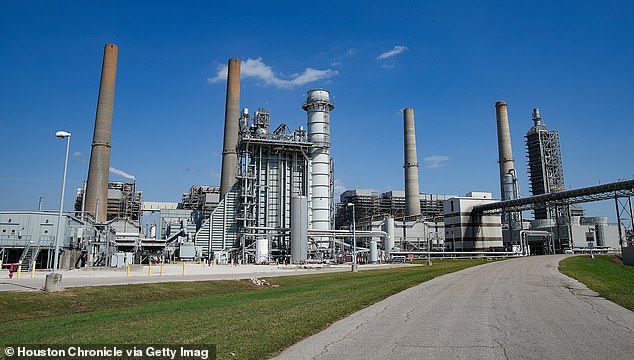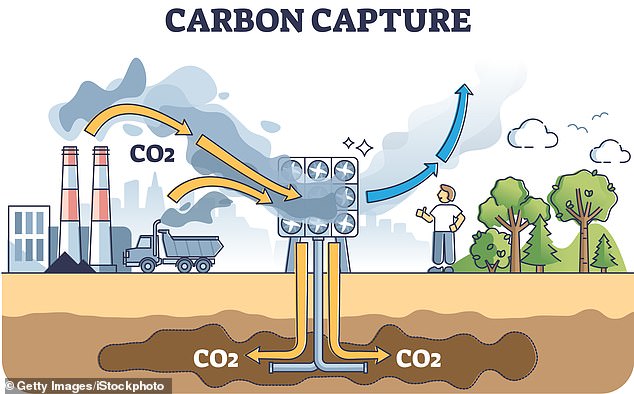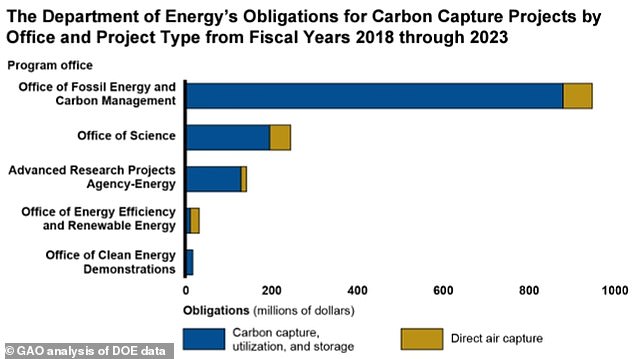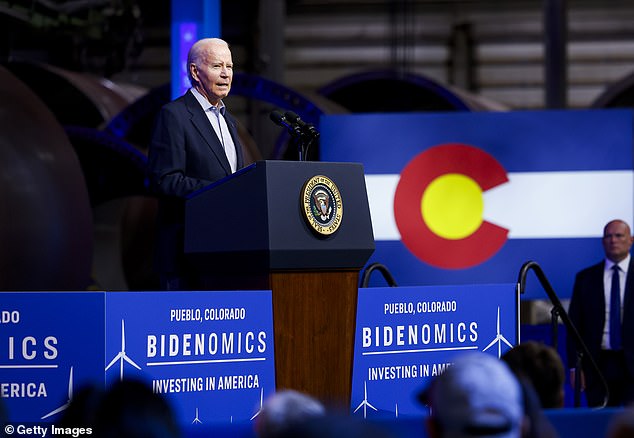A government watchdog has criticized energy chiefs for spending $1.4 billion of taxpayers’ money studying ill-fated carbon capture plans that were unlikely to help tackle climate change.
Between 2018 and 2023, the Department of Energy (DOE) poured cash into 654 carbon capture projects without adequately proving they were worthwhile, the Government Accountability Office (GAO) says.
The audit is especially alarming as many more taxpayer dollars go toward research into carbon capture: President Joe Biden has set aside $12 billion for such studies under his landmark Inflation Reduction Act.
Some experts say capturing and storing carbon pollution can limit heat-trapping gases from burning fossil fuels, but critics say it is hugely expensive and nearly impossible to do at scale.
For its audit, the GAO focused on DOE’s “risk reviews” of 40 research projects, which investigate how grant money is spent and whether it can help combat greenhouse gas emissions.
President Joe Biden plans to spend $12 billion on carbon capture research under his signature Inflation Reduction Act.

Some experts question the value of carbon capture plants, like this one at a power plant in Richmond, Texas
Auditors found several cases in which the department detected risks but still doled out taxpayer cash.
Energy bosses were often “overly optimistic” about the results they would achieve, says the 29 page audit.
It failed as many as 25 reviews, the GAO says, using practices that could “undermine the likelihood of project success.”
In one case, the department spent $14.6 million on a study that wasn’t worth the money and then suffered delays and cost overruns.
Researchers on that project hadn’t even checked whether it was possible to store carbon at the site proposed in their grant application.
That study is now $5.1 million over budget and more than a year behind schedule, according to the audit.
The DOE “engaged in some practices that could expose taxpayer funds to the risk of financing failed projects and undermine the likelihood of project success,” the auditors concluded.
They urged the department to be more selective about which projects to fund and to study the risks more carefully.

The capture process involves extracting carbon from power plants and other sources and storing it safely underground.

Energy Secretary Jennifer Granholm speaks at a clean energy meeting in New York City.

Auditors found that the Energy Department spent $1.4 billion of taxpayer money on research into failed carbon capture schemes.
Brad Crabtree, US undersecretary for fossil energy, in a response letter said the department would follow the warnings.
The department did not respond to DailyMail.com’s request for comment.
It is not the first time energy chiefs have been reprimanded for their carbon capture plans.
In 2021, auditors found that the department spent $472 million on projects that were never built.
The audit comes at a time when carbon capture is under a new spotlight due to the massive injection of cash into research under the IRA and new rules on carbon emissions from power plants.
Scientists and engineers are turning to carbon capture technologies in a desperate effort to reduce heat-trapping gases for fear they will worsen wildfires, storms and droughts.
The process, which involves extracting carbon from power plants and other sources and storing it safely underground, has attracted a lot of attention and investment in recent years.
But critics say it’s a waste of time, money and effort.
Basav Sen of the Institute of Policy Studies mocks carbon capture as “speculative” science.
Dr Faith Birol, head of the International Energy Agency, says it is “wishful thinking” as the amounts of carbon capture needed to reduce climate change are “implausibly large”.


